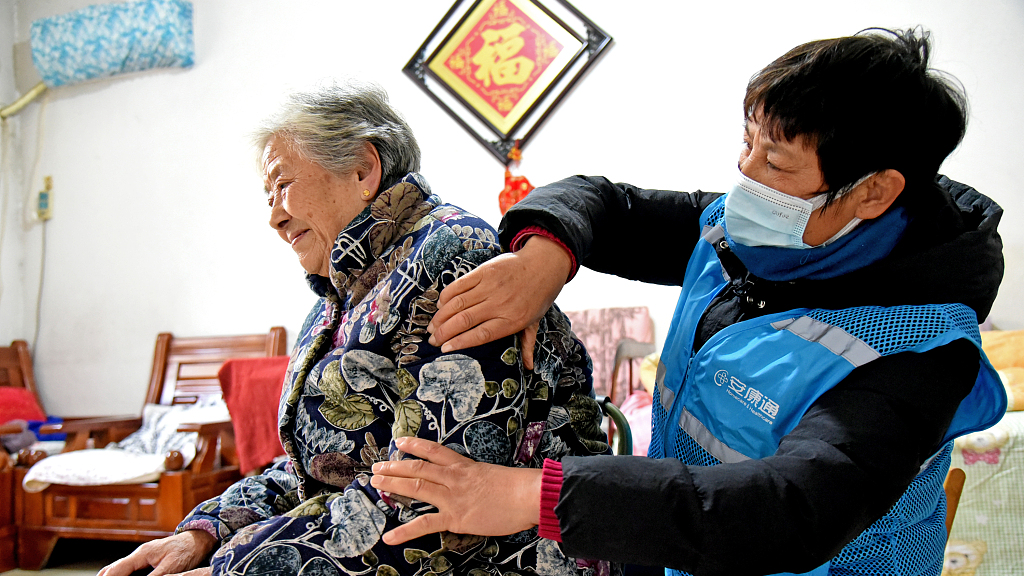
A home care worker massages 83-year-old woman at her home in Lianyungang City, Jiangsu Province, December 6, 2021. /CFP
A home care worker massages 83-year-old woman at her home in Lianyungang City, Jiangsu Province, December 6, 2021. /CFP
Home care worker Zeng Xianli still remembered one of her clients - a 94-year-old lady with Alzheimer's disease. Due to the disease, she could not take care of herself or recognize her family members, so she needed someone else to look after her.
Zeng assisted the elderly as her daughter struggled to care for her mother and her husband, a cancer patient.
During her one-hour shift, Zeng helped the elderly take a shower, wash her hair and also do finger gymnastics to improve her reaction ability.
Though the elderly lost most of her memory, she remembered Zeng, who accompanied her when watching cartoons and called her "my good friend."
The home care service Zeng has provided does not cost much. For example, in Zeng's case, the elderly's daughter only needed to pay 201.5 yuan ($30) each month, which is only 10 percent of the total fee. The other 90 percent of the fee is covered by insurance called long-term care insurance.
The main function of long-term care insurance is to provide services or financial guarantees for the basic living care of long-term disabled persons and the medical care closely related to basic living, thus effectively reducing the economic burden and care burden of families.
"The exploration and improvement of long-term care insurance matter a lot in China's active response to the increasingly aging population," Fang Ya, an expert on aging in Xiamen University.
With the rapidly aging Chinese population, the proportion of the disabled elderly becomes larger and larger.
A study conducted by Fang and his fellows estimated that the number of disabled elderly in China will grow rapidly from 43.75 million in 2020 to 91.4 million in 2050, and the growth rate of mildly, moderately and severely disabled elderly in 2050 is 108 percent, 104 percent and 120 percent respectively, comparing to 2020.

A home care worker prepares dinner for a blind elderly at her home in Fuzhou City, Fujian Province, China, November 24, 2020. /CFP
A home care worker prepares dinner for a blind elderly at her home in Fuzhou City, Fujian Province, China, November 24, 2020. /CFP
The remarkable growth, on the one hand, has much to do with the widely-known fact that China is a top-ranked populous country worldwide. The aging of the population is characterized by a large base and rapid growth, said Fang, adding that physical decline resulting from aging brings noticeable health problems like disability and dementia.
And on the other hand, people with a chronic diseases like diabetes and hypertension have much potential to be disabled elderly, Fang said.
Fang also mentioned the human and economic costs families, especially the adults, need to pay in caring for disabled elderly.
"For the disabled elderly, it's most pressing to provide them basic living and medical care services to provide them a decent life," Fang said.
Initiated in east China's Qingdao City in 2012, the long-term care insurance has covered more than 140 million residents in 49 cities in China as of the end of 2021, with 1.6 million disabled persons benefiting from it, the Paper reported, citing statistics.
In 2022, multiple regions in China decided to expand insurance coverage. For example, in Beijing, east China's Xuzhou City and southwest China's Chongqing Municipality, the long-term care insurance will cover all residents instead of only those in pilot areas.
Acknowledging the remarkable achievements the long-term health insurance has made countrywide, Fang also pointed out two challenges ahead. One of them is that most regions only include the severely disabled elderly in the insurance, and the other one is that there is still no unified scientific evaluation of the grades of disabled elderly.
Zhang Lin, an aging expert at Hunan University, also advised that it's urgent to introduce a national standard on the competency assessment of the elderly.
Today marks the annual World Population Day, and the UN said in a report that the world's population is expected to reach eight billion on November 15.

